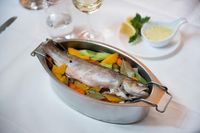In Aargau, Switzerland, the tradition of eating fish on Good Friday remains a cherished custom, with local restaurants experiencing a surge in demand for fish dishes on this solemn day. As many prepare to observe the holiday, the question arises: is this tradition still alive and well in the region?
Good Friday, observed on April 17, 2025, is known as one of the strictest fasting days in the Christian calendar, marking the crucifixion of Jesus Christ. For many families, the tradition of abstaining from meat in favor of fish has been passed down through generations. Luzia Finazzi, who has dedicated 47 years to the Speiserestaurant Hallwyl in Seengen, notes that Good Friday is one of the busiest days of the year for her establishment. "Karfreitag ist jeweils einer der intensivsten Tage im Jahr," she states, emphasizing the high volume of customers that flock to her restaurant.
Finazzi reveals that the restaurant has been fully booked for lunch for two weeks leading up to the holiday, offering six different fish menus featuring local species like perch, pike-perch, pike, and trout. "Ich freue mich auf alle unsere Gäste," she adds, expressing her excitement for the day ahead. The restaurant's location near Hallwilersee adds to its appeal, drawing both locals and visitors alike.
Another popular spot, the Restaurant und Seehotel Delphin in Meisterschwanden, also sees a significant influx of patrons on Good Friday. Owner Claude Fischer describes the day as "der strengste Tag im Jahr," comparable only to Mother's Day in terms of business volume. The Delphin restaurant stands out by offering continuous warm meals from 11:30 AM to 9:00 PM, accommodating guests throughout the day. Fischer highlights that many of his customers have been visiting for decades, indicating a strong continuity of the tradition.
While some restaurants opt for Easter breaks or limited menus, the trend of dining out for fish on Good Friday appears robust. However, the question of the tradition's origins remains. Theologian Alois Metz, who works with the Roman Catholic Church in Aargau, explains that the practice stems from the significance of Good Friday as a day of mourning. "Der Karfreitag ist einer der strengsten Fastentage im Jahr. Eigentlich geht es vor allem darum, am Tag nur eine sättigende Mahlzeit zu sich zu nehmen," Metz explains, emphasizing the importance of fasting and reflection.
Moreover, Metz points out the symbolic nature of eating fish on this day, which served as a secret sign among early Christians. "Der Fisch war ein geheimes Erkennungszeichen der verfolgten Christen," he notes, underlining how this practice has evolved into a broader cultural tradition. Interestingly, Metz observes that while the demand for fish on Good Friday remains high, he perceives a shift in the practice's significance. "Die Form ist da, der Inhalt ist weg," he remarks, suggesting that while the tradition persists, its deeper meaning may have faded for some.
In contrast to the vibrant fish-eating tradition in Aargau, Good Friday in Germany is marked by a different set of customs and regulations. On the same day, various restrictions apply, including a nationwide dance ban and limits on public events. The day is classified as a "Silent Day," with laws designed to uphold its solemn nature. Moving is prohibited to avoid noise disturbances, and many businesses, including car washes in states like Brandenburg and Bavaria, remain closed.
Public performances of music and dance are also restricted, with regulations varying by state. In Bavaria, for instance, public music performances in pubs are generally banned, while in Berlin and Bremen, the rules are more relaxed, allowing dancing from 9 PM on Good Friday. Hessen leads the way with the most days designated as dance ban days, totaling 15 each year. Violators of these dance bans can face fines, with penalties reaching up to 10,000 euros in some regions.
The regulations also extend to film screenings, with only movies that maintain the "serious character" of the day permitted. This has led to a list of films deemed inappropriate for public viewing, ensuring that the day's solemnity is respected. Interestingly, private gatherings are not subject to the same restrictions, allowing individuals to celebrate quietly at home, as long as they refrain from loud music that could disturb the peace.
As the tradition of eating fish on Good Friday continues to thrive in Aargau, it serves as a reminder of the rich cultural heritage surrounding this solemn day. The bustling fish restaurants reflect a community that values its customs, even as the deeper meanings may evolve over time. In Germany, the regulations surrounding Good Friday highlight a different approach to observing the day, emphasizing reflection and respect for its historical significance.
Ultimately, whether in the lively fish eateries of Aargau or the quiet observances in Germany, Good Friday remains a poignant reminder of faith and tradition, binding communities together through shared practices and beliefs.






